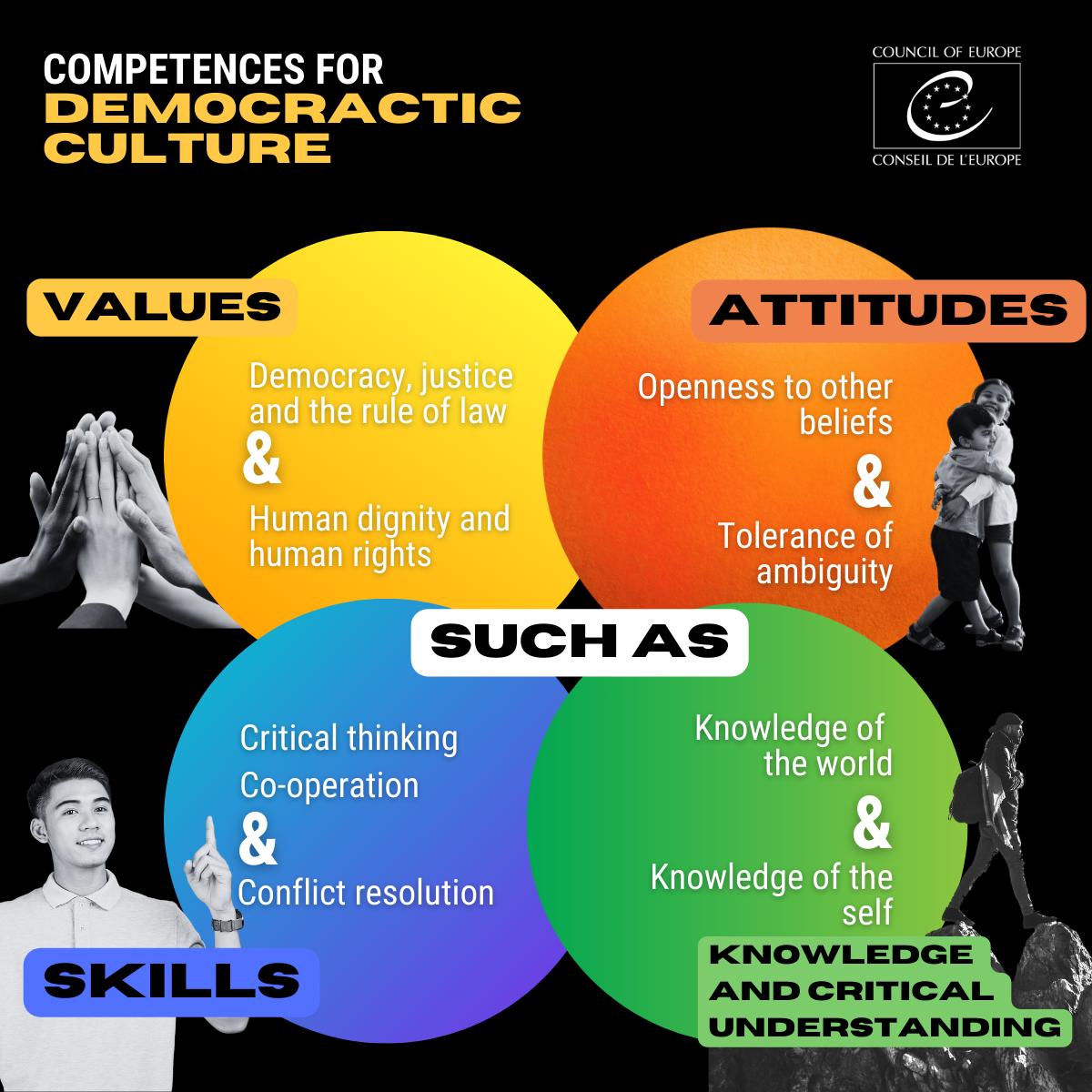RFCDC and history teaching
Values are general beliefs that individuals hold about the desirable goals that should be striven for in life. Values transcend specific actions and contexts, and they have a normative prescriptive quality about what ought to be done or thought across many different situations. Values are essential in the context of conceptualising the competences that enable participation in a culture of democracy. This is because without a specification of the particular values that underpin these competences, they would not be democratic competences but would instead be more general political competences that could be used in the service of many other kinds of political order, including anti-democratic orders.
An attitude is the overall mental orientation which an individual adopts towards someone or something (for example a person, a group, an institution, an issue, an event, a symbol). Attitudes usually consist of four components: a belief or opinion about the object of the attitude, an emotion or feeling towards the object, an evaluation (either positive or negative) of the object, and a tendency to behave in a particular way towards that object.
A skill is the capacity for carrying out complex, well-organised patterns of either thinking or behaviour in an adaptive manner in order to achieve a particular end or goal. There are eight sets of skills that are important for a culture of democracy. For instance, analytical and critical thinking skills consist of a large and complex cluster of interrelated skills. Analytical thinking skills are those skills that are required to analyse materials of any kind (for example texts, arguments, interpretations, issues, events, experiences) in a systematic and logical manner. Critical thinking skills consist of those skills that are required to evaluate and make judgments about materials of any kind.
Knowledge is the body of information that is possessed by a person, while understanding is the comprehension and appreciation of meanings. The term “critical understanding” is used to emphasise the need for the comprehension and appreciation of meanings in the context of democratic processes and intercultural dialogue to involve active reflection on and critical evaluation of that which is being understood and interpreted (as opposed to automatic, habitual and unreflective interpretation).

The Reference Framework of Competences for Democratic Culture (RFCDC)
The Council of Europe Reference Framework of Competences for Democratic Culture (RFCDC) originates in an initiative from Andorra during its Chairmanship of the Council of Europe Committee of Ministers in 2013.
The RFCDC as a set of materials can be used by education systems to equip young people with all of the competences that are needed to take action to defend and promote human rights, democracy and the rule of law, to act as active citizens, to participate effectively in a culture of democracy, and to live peacefully together with others in culturally diverse societies.
It is intended for use by education policy makers, especially those working within ministries of education, and by education practitioners in all sectors of education (pre-school, primary and secondary education, vocational education and training, higher education and adult education). The RFCDC provides a systematic approach to designing the teaching, the learning and the assessment of competences for democratic culture.
History Teaching and the RFCDC
Knowledge and critical understanding of history are an important component of the set of competences promoting democratic culture. This includes:
- Knowledge and understanding of the fluid nature of history and of how interpretations of the past vary over time and across cultures.
- Knowledge and understanding of particular narratives from different perspectives about the historical forces and factors that have shaped the contemporary world.
- Understanding of the processes of historical investigation, in particular of how facts are selected and constructed, and how they become evidence in the production of historical narratives, explanations, and arguments.
- Understanding of the need to access alternative sources of information about history because the contributions of marginalized groups (e.g. cultural minorities and women) are often excluded from standard historical narratives.
- Knowledge and understanding of how histories are often presented and taught from an ethnocentric point of view.
- Knowledge and understanding of how the concepts of democracy and citizenship have evolved in different ways in different cultures over time.
- Knowledge and understanding of how stereotyping is a form of discrimination that has been used to deny individuality and diversity to human beings and to undermine human rights, and in some cases has led to crimes against humanity.
- Understanding and interpreting the past in the light of the present with a view to the future, and understanding the relevance of the past to concerns and issues in the contemporary world.
Where to find the full volumes?
| Volume one of the Reference Framework contains the model of competences for democratic culture that was unanimously approved by European ministers of education at their standing conference in Brussels in April 2016. | |
| Volume two lists the descriptors of the competences for democratic culture that are intended to help educators identify learning outcomes, achieved proficiency after a period of learning, and areas for further development. | |
| Volume three offers guidance on how the model of competences and the corresponding descriptors may be used in six education contexts. | |
| All volumes are available in the following languages: Albanian, Armenian, Azeri, English, Finnish, French, Georgian, German, Greek, Italian, Macedonian, Protuguese, Romanian, Serbian, Slovak, Spanish, Turkish, Ukrainian | |












